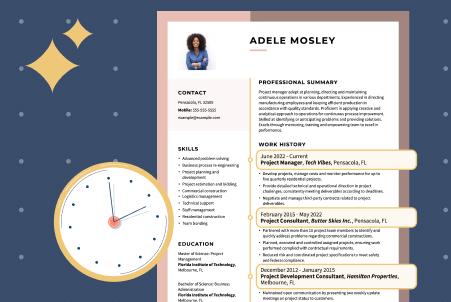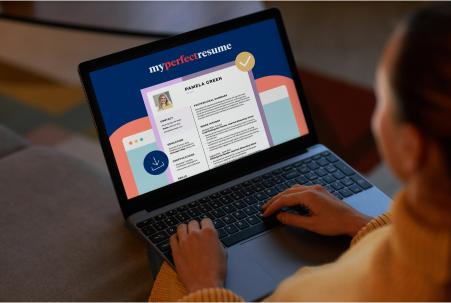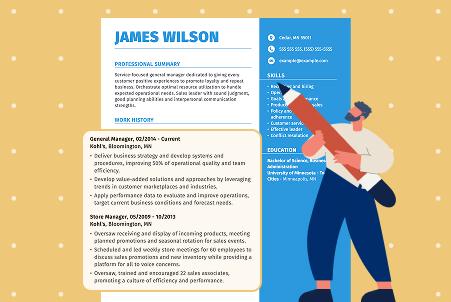How Many Years Back Should a Resume Go?

Our customers have been hired at: *Foot Note
Table of Contents
Get started with MyPerfectResume today!
- Build a resume on any device
- Pick an ATS-friendly template
- Tailor with AI copy suggestions
When writing your resume, one of the trickiest decisions to make is how far back to go.
Include too much, and your resume risks becoming a cluttered history lesson; leave out too much, and you may miss showing experience that could make you stand out. So, how do you find that sweet spot?
In this article, we'll break down the key factors to help you determine how far back your resume should go — ensuring it's both concise and compelling.
How Many Years of Experience Should Be on a Resume?
The short answer: no more than 15 years.
Anything over 15 years is considered irrelevant to your current career stage and can make your resume too lengthy.
When creating your resume, your aim should always be to concisely communicate the qualifications that make you the best candidate for the role in no more than two pages.
However, if you're still on the fence and want to decide for yourself, here are some tips to help you determine how far back work experience should go on a resume.
Consider the position
One crucial factor in deciding how far back should you go on a resume is the role you're applying for.
If you're a job seeker with minimal experience applying for an entry-level role, listing all your previous positions is OK.
However, hiring managers looking for a mid-level employee with eight years of experience in a specific industry do not want to read a resume recounting your last 20 years of experience.
A resume should be two pages at most, so consider what the position needs and how you can tailor your resume to meet those needs.
Determine the relevance of your past roles
Remember, recruiters and hiring managers want skimmable resumes to quickly decide whether a candidate can proceed to the next stage of the hiring process.
Once you consider the position's needs, review your work experience to determine which of your past roles is relevant to the one you're applying for.
Say you're applying for a senior content editor position, and the job posting asks for nine years of copywriting and editing experience. While your college customer service job taught you valuable interpersonal skills, it is irrelevant to this particular job application and can be omitted from your resume.
Repeating this exercise with each job application will help you progressively create more targeted resumes.
Evaluate your career level and industry
While relevancy and the position's needs are the standard advice for resumes, there are some instances where a job seeker should include more than 15 years of experience.
Use this quick guide to see how far back your resume should go depending on your situation:
- Entire career: academics, researchers, and federal workers.
- 15+ years: Workers with career gaps, professionals who worked for prestigious companies.
- 10-15 years: Workers with a standard career history.
- 5-10 years: IT and systems professionals.
- Up to 5 years: Career changers.
- As much as you have: entry-level workers.
How Long Should a Resume Be?
Typically, a resume should be two pages at most. Resume length depends on your years of experience. Here's a simple guide:
- One page: Entry to mid-level candidates with 10 years or less experience should stick to a one-page resume.
- Two pages: Experienced candidates with over a decade of career history can use two pages to showcase their growth.
How to Include Early Work History in Your Resume
If you want to add context to your career history by including older work experiences, consider these options:
Create a career highlights section
Instead of listing older job roles with company names and employment dates, create a bullet list of significant career moments or short descriptions of relevant experiences from the beginning of your career.
Here's how it might look:
Career Highlights – Early Career:
- Rapid career growth: Promoted twice within five years, progressing from social media manager to marketing manager due to strong performance and leadership.
- Brand awareness expansion: Developed and executed branding strategies that increased brand recognition by 50%, positioning the company as a key competitor.
- Innovative digital marketing: Led the company's first social media strategy, growing engagement by 200% and driving a 15% increase in online sales.
- Award-winning campaigns: Contributed to a national advertising campaign that won an industry award for creativity and effectiveness.
Mention it in your resume summary
An effective way to include older career experience in your resume summary is to showcase how your early achievements contributed to your expertise and current success.
Here's an example:
Use your cover letter
While a resume relies on bullet points and concise, action-oriented language, a cover letter provides more room to develop your career story and start a conversation with your potential employer.
Instead of using valuable resume space to discuss your early career, weave it into your cover letter to showcase your professional growth. Talk about those pivotal achievements in your early years that led to your current knowledge and recognition.
See this example:
Key Takeaways
- Usually, 15 years is enough work history for a standard resume.
- If you’re unsure how far back your resume should go, consider the position, relevance of your past roles, career level, and industry.
- When creating a career highlights section, use bullet points to showcase significant moments in your early career.
- Focus on highlighting how your early career achievements contributed to your current success when writing about older experiences in your resume summary.
- You can weave your early work experience into your career story in your cover letter and save space in your resume.
FAQ
When should you remove old jobs from your resume?
If your career history spans over 15 years or has a lot of different job roles, only include those relevant to the position you’re applying for.
Read the job description carefully and search for keywords that fit the employer’s needs. Review your work experience and only add the ones that prepared you with the skills and knowledge needed for the role.
Does the 10 to 15-year rule apply to all industries?
No. Some industries, like academia, government, or highly specialized fields, may require a more extensive career history.
How does career change affect how far back I should go?
If switching careers, highlight transferable skills and relevant experience, even if it’s older, while de-emphasizing unrelated roles.
Our customers have been hired at:*Foot Note











